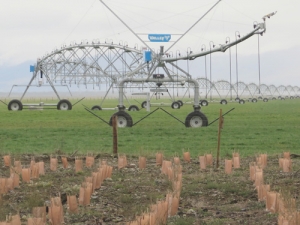Wired for Science: Understanding the feeding habits of mealybug
Fussy children might be frustrating, but fussy mealybugs could help protect the New Zealand wine industry from grapevine leafroll-associated virus 3.
 The Ngai Tāhu Farming project shows there are "means and ways" to restore natural biodiversity into a dairy farming environment.
The Ngai Tāhu Farming project shows there are "means and ways" to restore natural biodiversity into a dairy farming environment.
A new study is showing dairy and conservation sites can co-exist, and its findings are contributing to an ongoing project restoring natural biodiversity into a dairy farming environment.
'Persistence of biodiversity in a dryland remnant within an intensified dairy farm landscape', looks at Bankside Scientific Reserve, a small (2.6 ha) remnant in Canterbury surrounded by dairy paddocks.
It still has valuable communities of native species, despite being impacted by nitrate and phosphate encroachment, and habitat fragmentation.
It concludes "it does not appear to be an intractable management issue for the interface between agricultural systems and conservation sites within a dairy landscape mosaic".
One of the study's authors, Professor of Ecology, Nick Dickinson, and other Lincoln scientists have been tasked by Ngāi Tahu Farming and Manawhenua from Tuahuriri Marae, to turn the little triangles of land which irrigators in paddocks cannot reach into an oasis for native plants and animals on Ngāi Tahu's Eyrewell dairy farm.
Professor Dickinson says the study shows there are "means and ways" to restore natural biodiversity into a dairy farming environment, and the Ngai Tāhu Farming project was an example, covering 150ha on 17 reserves, with a similar additional amount of native species being planted on paddock borders and under irrigators.
These create conditions for more than 65 species of plants to regenerate, and also provide corridors for insects and birds between the reserves.
The research hinges on finding the benefits to the farmer of doing this, to encourage more native planting, he says.
Agriculture and Forestry Minister Todd McClay is encouraging farmers and growers to stay up to date with weather warnings and seek support should they need it.
The closure of SH2 Waioweka Gorge could result in significant delays and additional costs for freight customers around the Upper North Island, says Transporting New Zealand.
OPINION: The year has started positively for New Zealand dairy farmers and things are likely to get better.
Ministry for Primary Industries (MPI) Director General Ray Smith believes there is potential for an increase in dairy farming in New Zealand.
New Zealand's new Special Agricultural Trade Envoy, Horowhenua dairy farmer, company director and former Minister of Agriculture, Nathan Guy says the Free Trade Agreement (FTA) with India is a good deal for the country.
New figures show dairy farmers are not only holding on to their international workforce, but are also supporting those staff to step into higher-skilled roles on farm.
OPINION: There will be no cows at Europe's largest agricultural show in Paris this year for the first time ever…
OPINION: Canterbury grows most of the country's wheat, barley and oat crops. But persistently low wheat prices, coupled with a…